 klaus-michael schneider
klaus-michael schneider
Keywords: education |
Links: FOTW homepage | search | disclaimer and copyright | write us | mirrors

FOTW beschäftigt sich mit der Wissenschaft der Vexillologie (Flaggenkunde).
Alle auf dieser Website dargebotenen Abbildungen dienen ausschließlich der Informationsvermittlung im Sinne der Flaggenkunde.
Wir distanziert uns ausdrücklich von allen hierauf dargestellten Symbolen verfassungsfeindlicher Organisationen.
Last modified: 2021-08-26 by  klaus-michael schneider
klaus-michael schneider
Keywords: education |
Links: FOTW homepage |
search |
disclaimer and copyright |
write us |
mirrors
See Also:
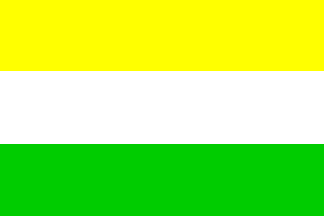 image by Ivan Sache, 4 January 2004
image by Ivan Sache, 4 January 2004
Colegio del Espíritu Santo was established on 28 November 1957 in Buga (Valle
Department) by the Marist Brothers, led by Friar José Bolaños Rodríguez. The
building of the school was supported and funded by several notables of the town,
led by Alejandro Domínguez Molina. Classes started on 13 October 1958. On 25
March 1968, Narciso Cabal Salcedo retired from the direction of Gimnasio
Central del Valle, which he offered to the corporation that ruled Colegio del
Espíritu Santo. The Clerics of San Viator, a congregation established in 1838 by
Louis Querbes, were granted the management of the institute from 1968 to 1972.
Later on, the institute was ran jointly by the corporation and by the Diocese of
Buga; on 23 June 1994, the institute was renamed Colegio Diocesano Gimnasio
Central del Valle and fully transferred to the Diocese.
Source: http://www.gcv.edu.co/ -
Institute's website
The flag of the institute is horizontally divided yellow-white-green. Yellow is
a symbol of the human, intellectual, and spiritual resources of the
students, and of the whole educational community. White is a symbol of peace and
healthy social interaction to be maintained inside the whole educational
community, and of the spiritual purity provided by God. Green is a symbol of
aspiration of the students to integral education and personal excellence,
as well as of permanent love and preservation of the natural, historical, and
cultural environment.
Source:
http://www.gcv.edu.co/index.php?option=com_content&view=article&id=15&Itemid=8
- Institute's website
Ivan Sache, 14 September 2014
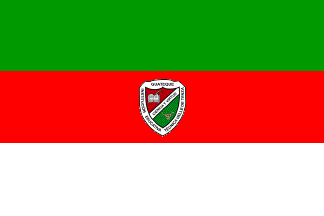 image by Ivan Sache, 18 November 2014
image by Ivan Sache, 18 November 2014
Institución Educativa Técnica Valle de Tenza is located in Guateque (Boyacá
Department). The institute is named for the Tenza Valley, which spreads over the
Boyacá and Cundinamarca Departments. Colegio Departamental Femenino Valle de
Tenza was established by Departmental Decree No. 195 of 6 March 1963. The
institute was renamed Colegio Nacionalizado Valle de Tenza in 1999 and Colegio
de Educación Básica y Media Técnica Valle de Tenza by Resolution No. 1,774 of 10
June 1998. Institución Educativa Técnica Valle de Tenza was eventually
established by Resolution No. 1,829 of 26 July 2002 as the merger with
Concentración Urbana Alianza.
The symbols of the institute are described in the Institute's Educational
Project as follows.
The flag is horizontally divided green-red-white. The green stripe symbolizes
faith and the aspiration of the youth to the emergence and increase of
integrity, respect, order, honesty, loyalty, efficiency and responsibility in
the institute's classrooms. The red stripe recalls that life is a sacrifice and
that the achievement of goals requires relentless struggle and work. The white
stripe means the purity of the deep and imponderable souls, minds and hearts
coated with inextinguishable virtues and skills.
The emblem was designed by the teacher José Antonio Salas. The diagonal white
stripe is inscribed with the institute's motto, "CIENCIA Y VIRTUD" (Science and
Virtue). The upper quarter is red with an open book and a quill, while the lower
quarter is green with an oil lamp. The white bordure of the emblem is inscribed
with the name of the institute and of the town.
Source:
http://www.tecnicavalledetenza.edu.co/index.php?option=com_content&view=article&id=33&Itemid=22
- Institute's website
The flag in actual use is charged in the middle with the institute's emblem.
Photos:
http://www.tecnicavalledetenza.edu.co/index.php?option=com_phocagallery&view=detail&catid=1:fotografias-50-anos&id=8:67241020033356323730233332288n&tmpl=component&Itemid=7
http://www.tecnicavalledetenza.edu.co/index.php?option=com_phocagallery&view=detail&catid=3:dia-del-boyacensismo&id=131:p02-10-130754&tmpl=component&Itemid=7
Ivan Sache, 18 November 2014
 image by Ivan Sache, 3 January 2021
image by Ivan Sache, 3 January 2021
Gimnasio Valle Del San Jorge (GIVASAJ), established in Planeta Rica (Córdoba)
by Omaira Esther Díaz Zapa, was approved by Resolution No. 12 issued on 26
January 2005.
The flag of GIVASAJ is horizontally divided
green-blue-green.
https://givasaj.edu.co/2020/02/simbolos-institucionales-2
School website
Ivan Sache,
3 January 2021
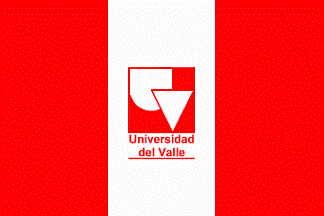 image by Ivan Sache, 30 December 2008
image by Ivan Sache, 30 December 2008
Translation from Universidad del Valle (Cali, Valle del Cauca)
website <www.univalle.edu.co>:
"The Valle University adopts a flag design possessing as a
basic feature a great symbolic force, giving red as a
representative color. The flag design shows three equal-sized
vertical bars, in order: red, white, red; representing the three
basic activities of the University: Teaching, Research and
Extension. In the central white bar the Logo is placed in
red. The flag must be used in every important events for the
University as one of its representative symbols".
Carlos Thompson, 27 May 2003
The logo of the university, shown on the flag, is presented on
the university
website as follows. "The logo is inscribed in a perfect
square with an inner structure made of nine square modules
forming the symbolic element "UV", which appears
inverted in relation with the square and colour scheme in which
it is inscribed.
The logo is complemented in its lower part by the name of the
institution, in Helvetica Bold font, placed above a thin red
horizontal stripe aimed at forming a stable, vertical
rectangle."
Ivan Sache, 30 December 2008
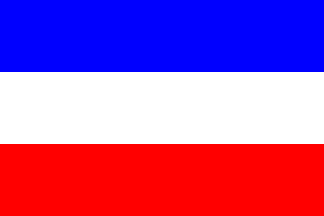 image by Ivan Sache, 09 July 2011
image by Ivan Sache, 09 July 2011
"Colegio Bilingüe de Valledupar" is located in Valledupar (Cesar Department).
The flag of the institute, as shown graphically on the institute's website, is
horizontally divided blue-white-red. The colors represents Valledupar, England
and the USA, as well as the two official languages of the institute, English and
Spanish.
Source:
http://www.colegiobilingue.edu.co/web/simbolos.htm
The flag is indeed the same as the flag of Valledupar.
Source:
co-cesva.html
Ivan Sache, 09 July 2011
 image by Ivan Sache, 11 March 2017
image by Ivan Sache, 11 March 2017
Institución Educativa Mayor de Valledupar was established on 14 February
2011 in Valledupar, Cesar Department, by Corporación Educativa Minuto de
Dios, a corporation founded in 1958 by Father Rafael García Herreros Unda
(1909-1992), which manages 24 educational institutes all over Colombia.
http://www.colegiosminutodedios.co - Institute's website
The flag
of the institute is horizontally divided blue-white-golden yellow with the
institute's emblem in the center.
http://www.colegiosminutodedios.co/valledupar/index.php/quienes-somos/nosotros/simbolos - Institute's website
Ivan Sache, 11 March 2017
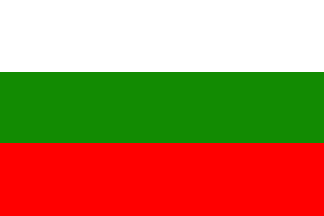 image by Ivan Sache, 3 January 2021
image by Ivan Sache, 3 January 2021
Gimnasio Vallegrande was established in Montería (Córdoba) in 1981 by José
Arcelio Garcés and Rafaela Luisa Begambre.
The flag of Gimnasio
Vallegrande is white-green-red.
http://www.vallegrande.edu.co
School website
Ivan Sache, 3
January 2021
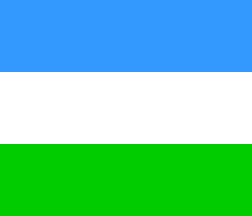 image by Ivan Sache, 15 November 2010
image by Ivan Sache, 15 November 2010
Escuela Urbana de Varones Mariano Ospina Rodríguez, located in Chinácota
(Department of Norte de Santander), was founded, as Escuela Pública de Varones ,
on 29 January 1908 by Eliseo Delgado and Antonio Bautista. In 1913, the
Municipal Council (Decree No. 5) granted a plot where the new Escuela Modelo de
Varones would be built and the required funding; the new building was
inaugurated on 10 January 1914. Subsequently changed to Escuela de Varones No.1.
(1931) and Grupo de Varones Antonio Ricaurte (1942), the name of the institute
was restored to Escuela Modelo de Varones in 1952. In 1960, it was renamed for
President of the Republic Mariano Ospina Rodríguez (1857-1861), whose government
supported educational institutes in Colombia.
The flag of Escuela Urbana de Varones Mariano Ospina Rodríguez is described on
the institute's website as horizontally divided light blue-white-green, with
dimensions 1.50 m x 1.75 (that is, proportions 6:7). Light blue means the
nobleness of the children's' spirit and triggers reflection, and evokes as well
the immensity of the sky and the sea. Considered as a cold color, blue keeps a
strong force, tranquillity and freshness that pushes to the background the
negative feelings of sadness, depression and loneliness. White, the color of the
central stripe, symbolizes the purity of the children's' spirit, evoking both
the children and their teachers; it is also the symbol of peace. Green,
the color of the third stripe, means hope that the alumni will be future
contributors of a new, better homeland. Designed by Alicia Rubio de Durán, Edgar
Emiro Lemus, Hermelina Buitrago de Camacho and Nancy Camacho Buitrago, the flag
was hoisted for the first time on 11 November 1989, during the opening ceremony
of the celebration of the Diamond Jubilee of the institute.
http://www.chinacota.com/ESCUELA%20MOR/ESCUELA%20MOR.html
Ivan Sache, 15 November 2010
 image by Ivan Sache, 26 June 2014
image by Ivan Sache, 26 June 2014
Colegio Venecia is located in the Venecia borough, part of the municipality
of Tunjuelito (Capital District).
The flag of the institute is horizontally divided white-blue with the
institute's emblem in the middle. White is a symbol of liberty, peace and purity.
Blue is a symbol of justice, truth and loyalty.
Source:
http://www.colegiovenecia.edu.co/index.php/simbolos/bandera - Institute's
website
The emblem of the institute is made of a shield shaped according to the heraldic
Hispano-American tradition. The eagle represents the New Kingdom of Granada and
the town of Santafé de Bogotá; the eagle means that the institute directly
depends of the Secretariat of Education of the Bogotá Special District.
The eagle is a symbol of liberty, activity and swiftness. The book is a
symbol of humanities, sciences and technology. St. Mark's lion with an halo and
an open book, here St. Mark's Gospel, are the symbols of the town of Venice. The
institute adopted the symbol of Venice to highlight friendship with the
town of Venice, to indicate open-mindedness to universal culture, and to
recall the Christian heritage. The lion is a symbol of power, vigilance and
protection.
Blue is a symbol of justice, truth and loyalty.
Black is a symbol of firmness, rigor, rectitude and prudence.
Gold is a symbol of light, constancy and knowledge.
Silver is a symbol of integrity and self-control.
Green is a symbol of hope, friendship, respect and service.
Red is a symbol of fight, strength and joy
Source:
http://www.colegiovenecia.edu.co/index.php/simbolos - Institute's website
Ivan Sache, 26 June 2014
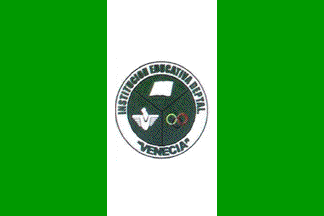 image by Ivan Sache, 07 August 2014
image by Ivan Sache, 07 August 2014
Institución Educativa Departamental Venecia is located in Venecia
(Cundinamarca Department).
The flag of the institute is vertically divided green-white-green with the
institute's emblem in the middle.
Source:
http://ievenecia.blogspot.fr/2012/11/himno-colegio-venecia-normal-0-21-false.html
- Institute's blog
Ivan Sache, 07 August 2014
 image by Ivan Sache, 08 July 2011
image by Ivan Sache, 08 July 2011
"Institución Educativa Versalles" (INEVE) originates in "Liceo Anexo
Versalles", a secondary seat of "Liceo Tomás O. Eastman" founded on 15 March
1974 (Decree No. 352) in the village of Versalles, Santa Bárbara (Antioquia
Department). Subsequently known as "Concentración Educativa Versalles", the
institute was renamed in 1996 "Colegio Versalles". It took its current name on
25 October 2002.
The flag of INEVE is described on the institute's website as horizontally
divided blue-white-green. Blue means nobleness, loyalty, watch, as well as the
highest sky above the mountains. White means purity, integrity, obedience,
firmness, watch, eloquence, innocence and virginity, as well as the clouds
covering the mountains and separating the sky from the green mountains. Green
represents hope, abundance, liberty, faith, friendship, service and respect, as
well as the local vegetation and agriculture.
The symbols (flag and emblem) were designed by Juan Carlos Cardona Corrales,
Willian Fernando Cardona Corrales, Marco Aurelio Castañeda Suaza, Luz Mery Corre
Quirama (d.), Dora Luz Quintero Serna and Martha Elcy Rios Rendon. The symbols
(including the anthem) were officially inaugurated in October 1986.
Source:
http://www.ineve.edu.co/simbolos
Ivan Sache, 08 July 2011
 image by Ivan Sache, 07 September 2014
image by Ivan Sache, 07 September 2014
Institución Educativa Comunal de Versalles (IECOV) was established in
Magangué (Bolívar Department) by Departmental Ordinance No. 20 of 29 November
2002, as the merger of Concentración Educativa Comunal de Versalles,
Concentración Mixta Barrio Sur, Concentración Mixta Ezequiel Atencio Campo,
Preescolar Municipal Ilusión, Escuela Municipal Mixta Costa Azul, and Escuela
Municipal Buenos Aires.
The flag of IECOV is horizontally divided yellow-white-green. Yellow is a symbol
of energy supplied by the sun, honour, loyalty, originality, and intelligence.
White is a symbol of light, peace, perfection, and safety. Green is a symbol of
harmony, as the colour of natural environment, of growth, fertility, freshness,
hope and renovation.
Source:
http://www.iecov.edu.co/simbolos.html - Institute's website
Ivan Sache, 07 September 2014
Hosted by: Fanshop-Online.de und Handy-Shop.de
Tipp: Apple iPhone 12 im Shop